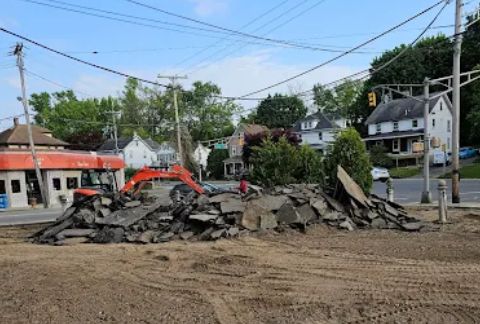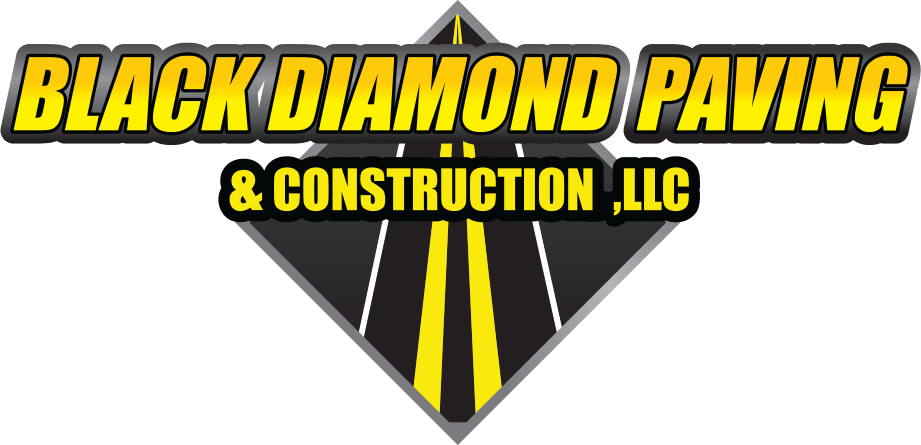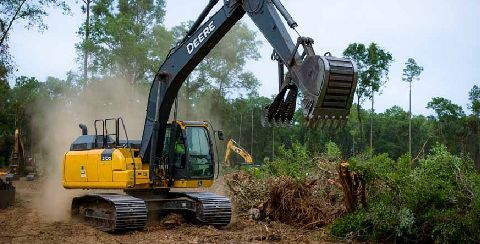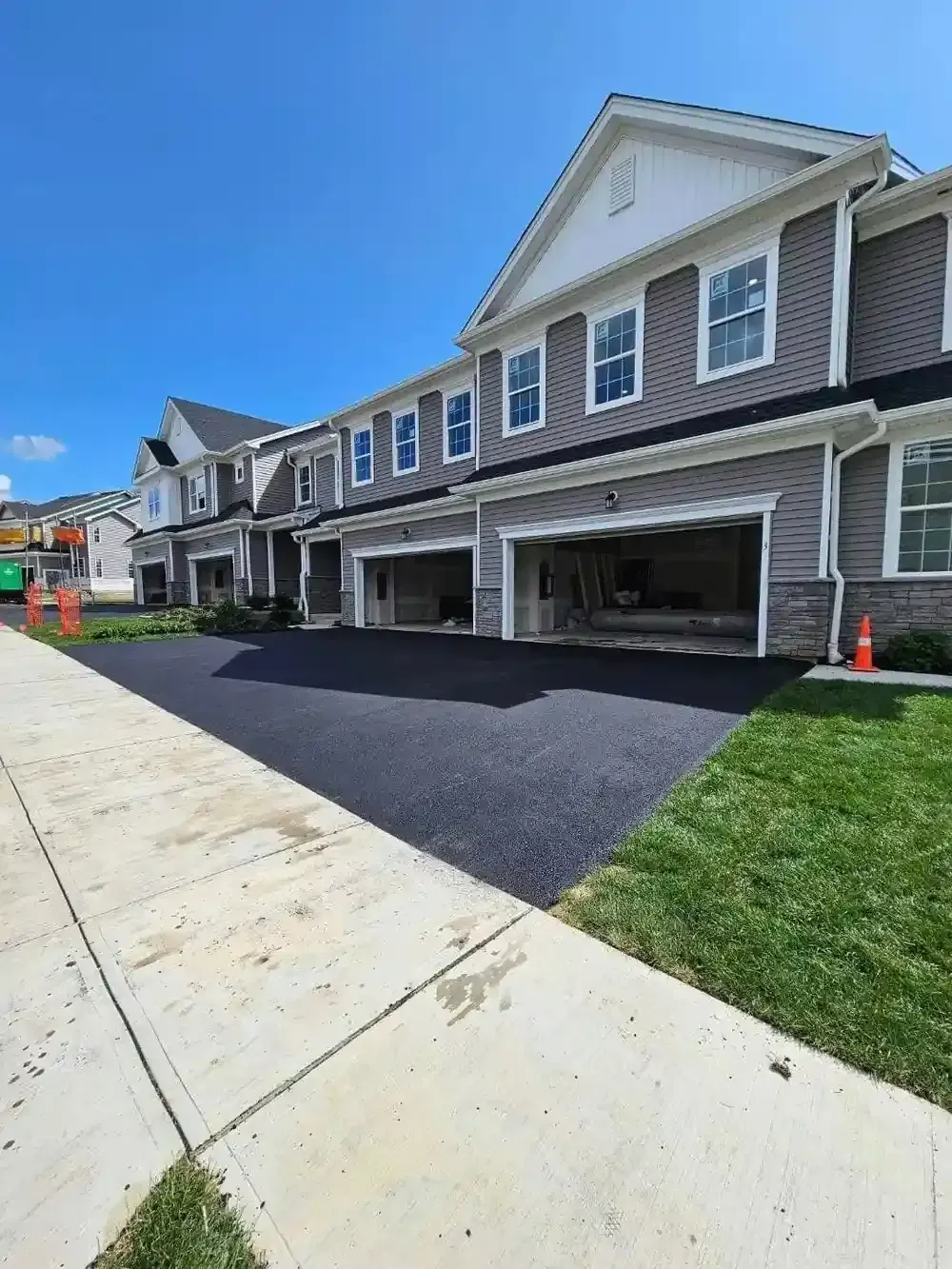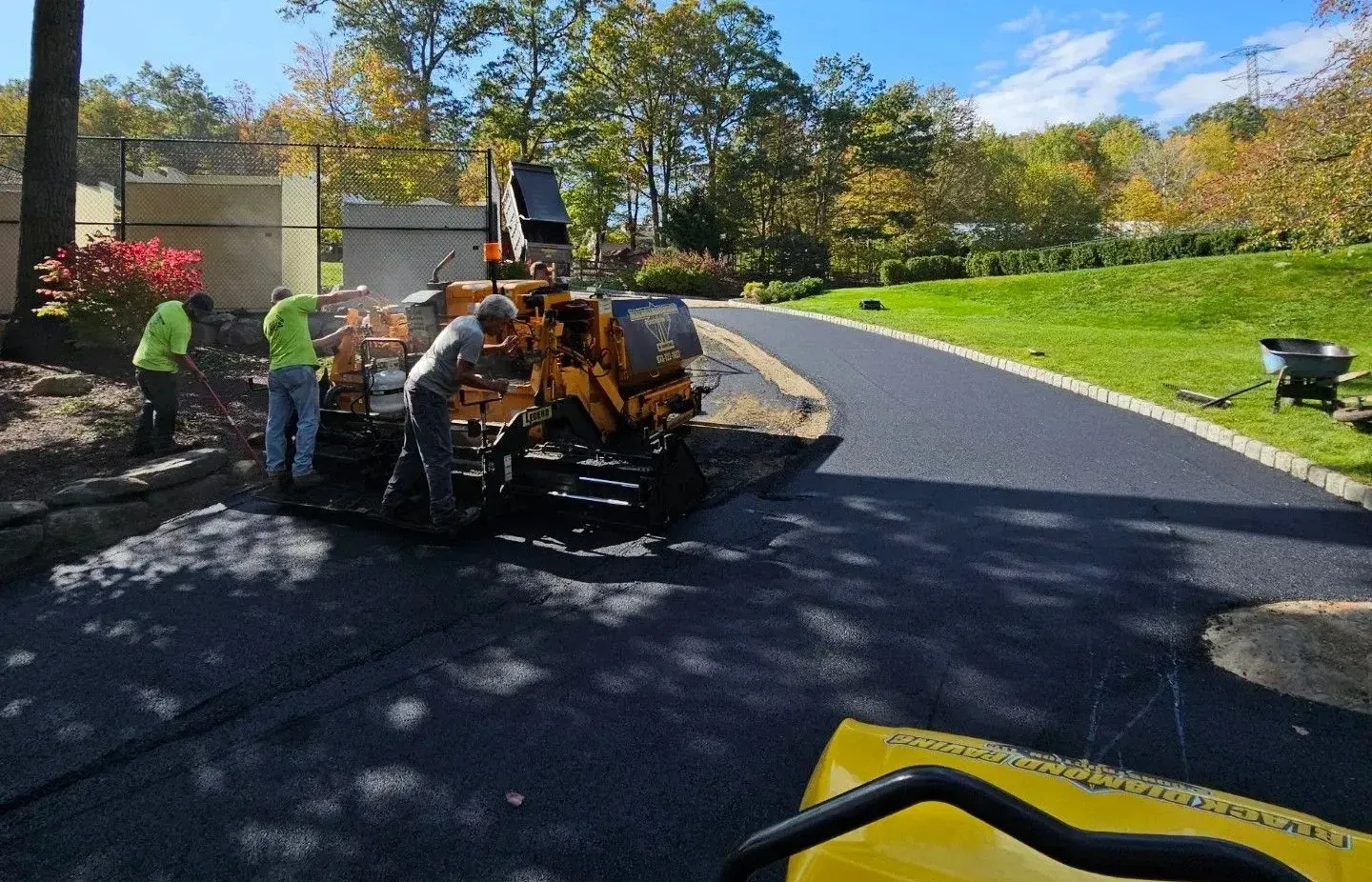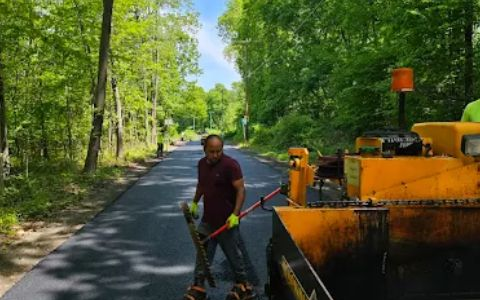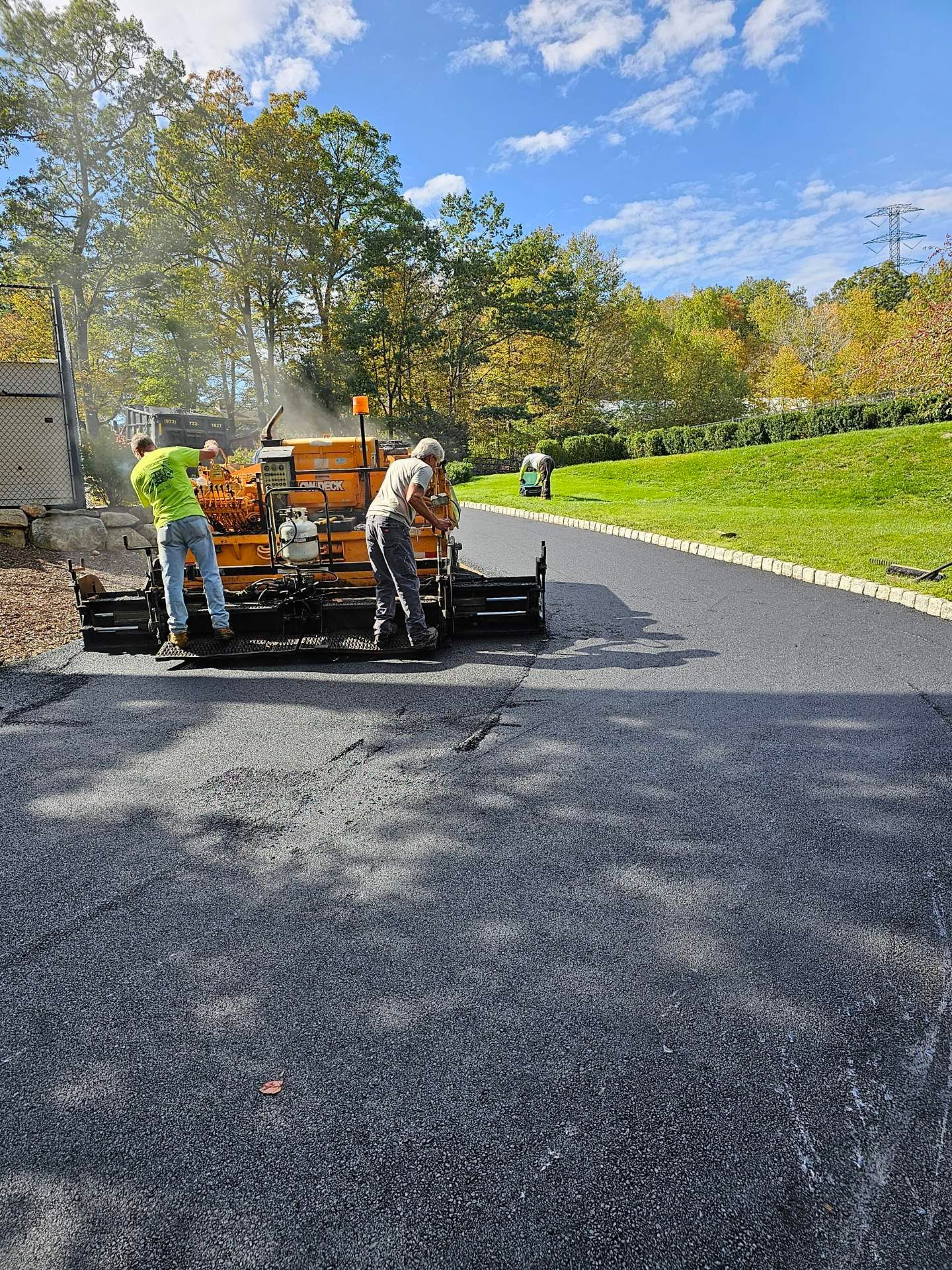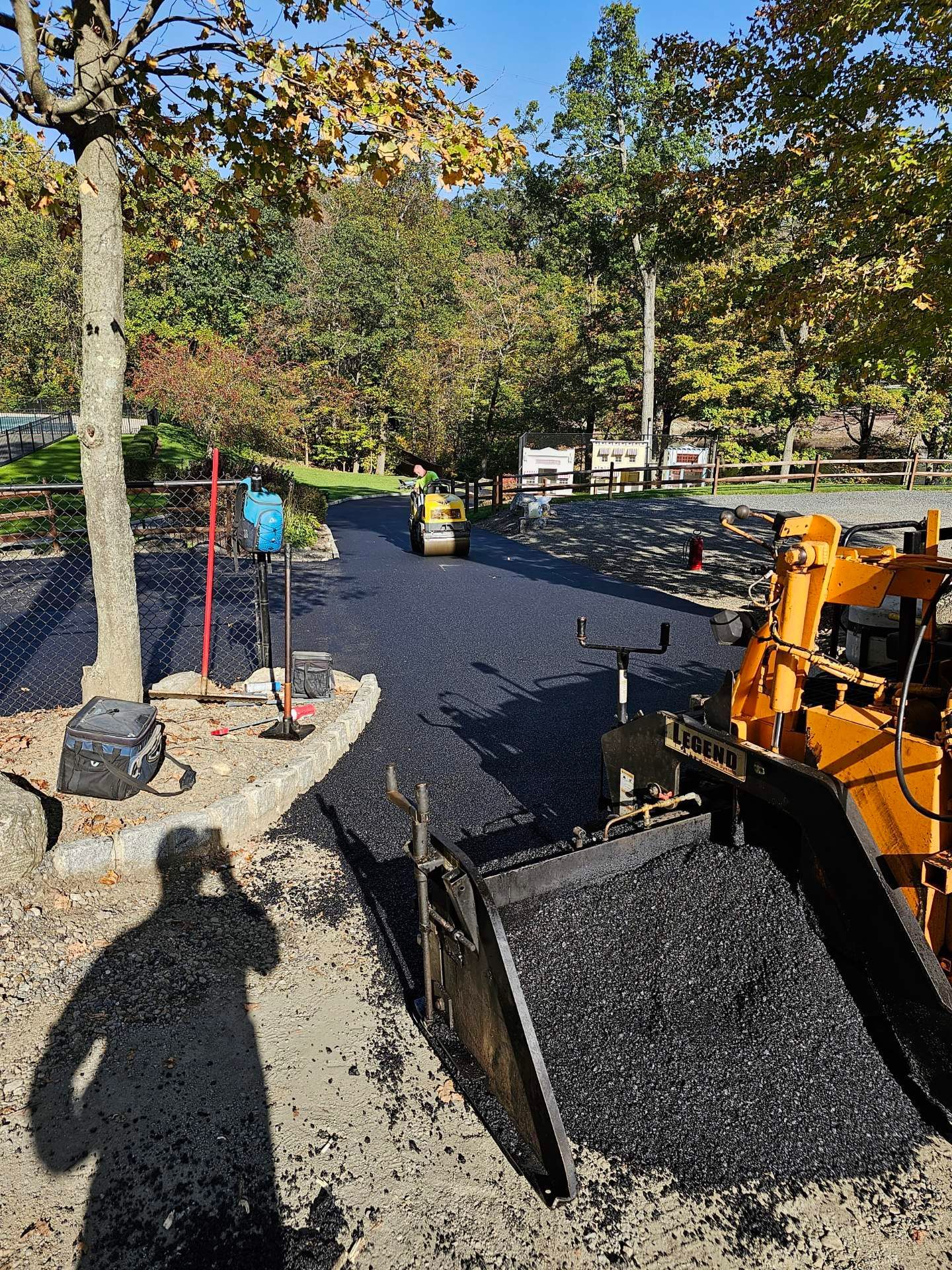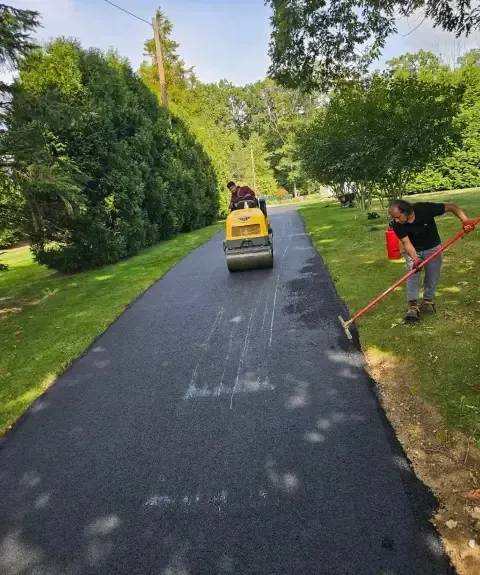Asphalt vs Concrete Driveways in NJ | Black Diamond Paving
Asphalt vs. Concrete Driveways in NJ: What’s Better for New Jersey Weather
As a New Jersey homeowner, you get the full four-season experience - beautiful falls, hot summers, and winters that seem determined to test everything you own, including your driveway. So, when you’re deciding between asphalt vs. concrete driveway in NJ, it’s not just about what looks nice. It’s about what will survive years of freezing nights, blazing sun, snow, salt, and everything in between.
At Black Diamond Paving, we talk to homeowners every day who ask the same question:
“What’s the best driveway material New Jersey weather won’t destroy?”
Grab a cup of tea and let’s walk through it together
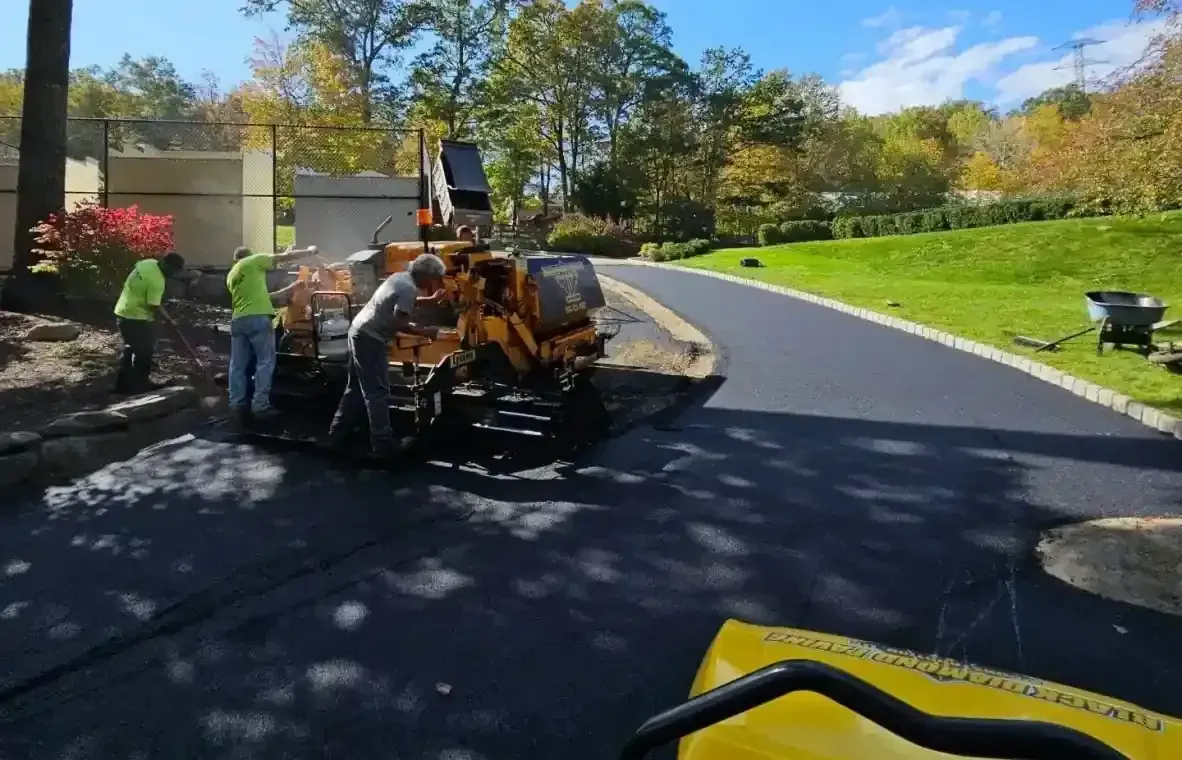
How New Jersey Weather Beats Up Your Driveway
Before we jump into asphalt vs. concrete, it helps to understand why driveways in New Jersey take so much abuse.
Here’s what your driveway deals with each year:
Freeze thaw cycles
Water gets into tiny cracks and pores in the surface. When temperature goes below the freezing point, water expands as it turns to ice. Then it melts. Then it freezes again. Over and over. That’s called freeze thaw driveway damage, and it slowly pries your driveway apart.
Snow, ice, and road salt
Shoveling, plowing, and de-icing salts all put your driveway under stress. Salt in particular is rough on certain materials, especially concrete.
Temperature swings
New Jersey can be below freezing at night and mild during the day. Materials expand and contract constantly, which can create or worsen cracks.
Summer heat and UV rays
UV rays and high temperatures can dry out and age some driveway surfaces over time.
When you line up
asphalt vs concrete driveway NJ options, you’re really asking:
“Which one handles all of this punishment better, and what’s the trade-off?”
Asphalt Driveways: Built for Movement and Flexibility
Asphalt is often the go-to choice for roads and parking lots in colder climates, and there’s a reason for that: it has a little “flexibility” to it. That flexibility is a big part of the asphalt driveway benefits NJ climate homeowners care about.
Benefits of Asphalt in NJ
Better at handling freeze thaw cycles
Asphalt is more flexible than concrete. When the ground shifts slightly or temperatures swing up and down, asphalt can move a bit without instantly cracking. That doesn’t make it invincible, but it does make it more forgiving.
Easier and cheaper to repair
Got a crack or a small pothole? With asphalt, repairs are usually simpler and more affordable. You can patch sections instead of replacing whole slabs. Over the life of your driveway, that can save a lot of money.
Faster installation and curing
Asphalt driveways can often be used sooner after installation than concrete. That means less waiting around and more getting on with your life.
Dark color helps in winter
Asphalt’s dark surface absorbs sunlight. On sunny winter days, that little bit of extra warmth can help melt snow and ice faster than on a light-colored concrete driveway.
Quiet and smooth to drive on
Asphalt has a softer feel under your tires. It tends to be quieter and can feel smoother to drive and walk on.
Things to Know About Asphalt
Needs regular maintenance
You’ll want to sealcoat your asphalt driveway periodically to protect it from water, sun, and oil stains. Think of it like routine checkups for your driveway.
Can soften in extreme heat
On very hot summer days, asphalt can get soft. It usually isn’t a big issue for residential driveways, but heavy vehicles parked in the same spot for long periods could leave slight negative impressions.
Even with these trade-offs, many homeowners see asphalt as the more practical choice when they’re thinking about asphalt driveway benefits in NJ climate over the long haul.
Concrete Driveways: Strong but Not Always NJ-Friendly
Concrete has a clean, bright look that some homeowners really like. It can be stamped, colored, or textured to mimic stone or pavers. In certain milder climates, concrete can last a long time with minimal issues.
But New Jersey isn’t exactly “mild,” especially in winter. That’s where concrete driveway problems NJ and homeowners face start to show up.
Pros of Concrete
Let’s be fair to concrete first:
●
Attractive appearance options
Stamped patterns and color options can give concrete a custom look that boosts curb appeal.
● Can handle high loads
Properly installed, concrete can deal with heavy vehicles and frequent use.
The Common Concrete Driveway Problems in NJ
Now for the other side of the story, especially important if you’re thinking about the best driveway material New Jersey weather will treat kindly.
Vulnerable to freeze thaw damage
Concrete is more rigid and less flexible than asphalt. When water seeps in and New Jersey’s freeze thaw cycles kick in, concrete slabs can crack, heave, or spall (that’s when small flakes or chunks start coming off the surface). This is classic freeze thaw driveway damage.
Sensitive to de-icing salts
Salt is very tough on concrete. It can lead to surface scaling, pitting, and long-term deterioration. In a state where salting roads and driveways is common, this is a big concern.
More expensive to fix once damaged
Cracks in concrete are harder to “hide.” Patches can be more visible, and if a slab settles or breaks badly, you might end up replacing the entire section. Repairs can add up quickly.
Longer curing time
Concrete takes longer to fully cure and reach strength. That’s more downtime before you can park vehicles on it.
So while concrete can be a good option in some situations, the concrete driveway problems NJ homeowners run into are very much tied to the kind of weather we get here.
Asphalt vs Concrete Driveway NJ: Head-to-Head Comparison
Let’s put it all together in a straightforward comparison so you can see how each material stacks up for New Jersey conditions.
Performance in NJ Weather
-
Asphalt:
Flexible, better able to handle ground movement and temperature swings. More resistant to severe freeze thaw driveway damage when maintained.
-
Concrete:
Rigid and more likely to crack under freeze thaw stress, especially with water and salt involved.
Edge: Asphalt
Cost and Repairs
-
Asphalt:
Typically lower initial cost. Repairs and resurfacing are usually more affordable and straightforward.
-
Concrete:
Often higher upfront cost. Repairs can be more expensive, and patched areas may be more noticeable.
Edge: Asphalt (for most budgets)
Maintenance
-
Asphalt:
Needs periodic sealcoating and crack filling, but these are relatively simple, common maintenance steps.
-
Concrete:
Less frequent sealing needed, but when damage occurs, fixing it can be tougher and pricier.
Edge: Slight edge to asphalt in New Jersey because proactive maintenance can greatly extend its life.
Winter Driving and Safety
-
Asphalt:
Darker surfaces might help the snow to melt faster under sun. Good traction, especially when properly textured.
-
Concrete:
Can be a bit more slippery when icy or wet if not textured. More sensitive to de-icing chemicals.
Edge: Asphalt
Winter Driving and Safety
-
Asphalt:
Clean, smooth, classic black look. Not flashy, but neat and uniform.
-
Concrete:
More options for decorative finishes and colors if you want a custom look.
Edge: Concrete (if you’re prioritizing decorative design over performance)
So, What Is the Best Driveway Material New Jersey Homeowners Should Choose?
If we’re looking purely at which surface stands up better to New Jersey’s tough mix of cold winters, freeze thaw cycles, summer sun, and road salt, asphalt usually comes out ahead.
Here’s why many homeowners end up going with asphalt:
● It handles freeze thaw driveway damage better, thanks to its flexibility.
● Repairs are easier and more budget-friendly over the life of the driveway.
● It plays nicer with New Jersey’s winter habits (snow, ice, and plenty of salt).
● It’s fast to install and you can start using it sooner.
Concrete isn’t “bad”, it just tends to shine more in gentler climates or when decorative appearance is the top priority and homeowners are prepared for the potential concrete driveway problems NJ weather can bring.
If your main goal is a driveway that can live with New Jersey weather, not fight it, asphalt is often the more practical long-term choice.
How Black Diamond Paving Can Help
Of course, every property is a little different. The right answer to asphalt vs concrete driveway NJ might depend on:
● How long you plan to stay in your home
● Whether you park heavy vehicles or equipment
● Your budget for installation and maintenance
● Your priorities: maximum durability, lowest long-term cost, or high-end decorative look
At Black Diamond Paving, we work across New Jersey and see firsthand what our winters do to driveways. We can:
● Take a look at your existing driveway and explain what’s happening to it in simple terms
● Talk you through the asphalt driveway benefits in NJ climate
● Help you understand your options and what’s realistic for your property and budget
● Install a driveway designed with your weather, soil, and usage in mind
Final Thoughts
Choosing the best driveway material New Jersey has to be about more than just what looks nice on day one. It’s about how that surface will handle year after year of:
● Freezing nights and thawing days
● Snow, ice, and salt
● Heat and sun
● Normal daily use from cars, trucks, and deliveries
For many New Jersey homeowners, a well-installed, well-maintained asphalt driveway is the smarter, more weather-resistant choice, especially when you factor in freeze thaw driveway damage and long-term repair costs.
If you’re still on the fence or want a professional opinion tailored to your specific home, Black Diamond Paving is here to help. We’ll walk your property with you, answer questions honestly, and help you choose the driveway solution that makes the most sense for your life in New Jersey—not just on paper, but in real-world, four-season reality.
Recent Posts
